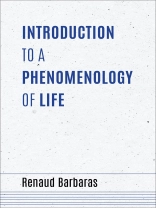In Introduction to a Phenomenology of Life, renowned French philosopher Renaud Barbaras aims to construct the basis for a phenomenology of life. Called an introduction because it has to deal with philosophical limits and presuppositions, it is much more, as Barbaras investigates life in its phenomenological senses, approached through the duality of its intransitive and transitive senses.
Originally published in French (Introduction à une phénoménologie de la vie) Introduction to a Phenomenology of Life first defines the problem of life phenomenologically, then studies the failures of the phenomenological movement to adequately think about life, and finally elaborates a new, original, and productive approach to the problem.
Combining original interpretations and expert readings of philosophers such as Heidegger, Henry, Bergson, and Merleau-Ponty, Barbaras offers a powerful and important contribution to phenomenology and continental thought.
İçerik tablosu
Introduction: Phenomenology and Life
Part 1: The Divisions of Life
1. Exteriority and Immanence
2. Existence and Incarnation
3. The Division of Movement
Conclusion: The Epoche of Death
Part 2: Life and Exteriority
Introduction: The Failure of Bergsonism
1. The Absolute Domains of Survey
2. Metabolism
3. Towards a Privative Anthropology
Part 3: Life and Desire
1. Desire as the Essence of Being-Alive
2. Desire and the Correlation
3. The Subject and the World
Conclusion
Index
Yazar hakkında
Renaud Barbaras is Chair of Contemporary Philosophy in the Sorbonne. His books in English include The Being of the Phenomenon: Merleau-Ponty’s Ontology and Desire and Distance: Introduction to a Phenomenology of Perception.
Leonard Lawlor is Edwin Erle Sparks Professor of Philosophy at Pennsylvania State University. His many books include Early Twentieth-Century Continental Philosophy. He previously translated Renaud Barbaras’s The Being of the Phenomenon: Merleau-Ponty’s Ontology.












